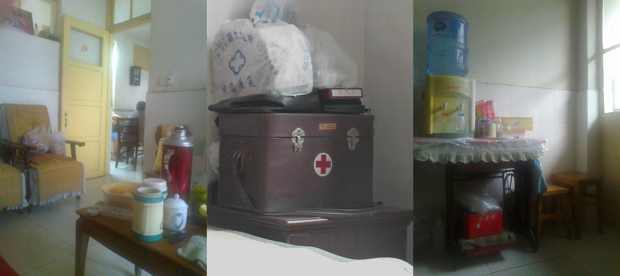
Glimpses of the flat my Chinese in-laws have called home during the two decades we have known each other. Photos taken in the summer of 2011.
In response to my last blog post, an influential journalist sent an email requesting information about my family ties to China. He heard my wife, who is now a U.S. citizen, is “the daughter of a high-level CCP (Chinese Communist Party) official.” She isn’t. He also wanted to know if I have ever stayed at my father-in-law’s “official residence” and whether I thought our relationship affected my “credibility as a commentator on Chinese affairs.”
I don’t know who started the rumor but this was not the first time it was raised in response to something I wrote. A colleague heard it mentioned during a Congressional staff briefing on China’s Underground Great Wall; a network of tunnels alleged to contain thousands of Chinese nuclear weapons. Since questions about my family ties are more prevalent than I imagined, I thought I should set the record straight.
My father-in-law was an officer in the PLA. He retired in the mid-1980s without a formal rank—since they had been abolished at that time—but lieutenant colonel is a rough equivalent of where he ended his career. He joined the Eighth Route Army when it passed through his village shortly before the end of the war against Japan, was assigned to the logistical department and served in Korea. Now in his mid-80s, this unassuming gentleman, until a recent fall, routinely walked across a busy thoroughfare to buy fresh vegetables at an inexpensive farmer’s market to save a little money.
Not exactly the profile of a “high-level CCP official.”
He lives with my mother-in-law on a modest pension in a small flat in a retirement compound (干休所) for PLA who joined before 1949. China privatized this type of housing back in the late 90s and he bought it with his savings, so it is his personal property. When we were living in China we would visit my wife’s family every year during the Spring Festival and we did stay at their place (pictured above). We cannot visit as often now.
My father-in-law never talks about his career in the military, his political opinions or much of anything, really. He is a reticent man. We speak sparingly and always about family. Needless to say he does not exert much of an influence on my commentary on Chinese affairs, although he does tell his daughter when my name pops up in the local newspaper. I’m not sure if this makes him proud, amused, embarrassed or annoyed.
It is not surprising that U.S. analysts who exaggerate the capabilities of China’s military would also embellish my father-in-law’s humble résumé. But there is a deeper problem embodied in perceiving personal ties to a China as a liability. Obtaining even a basic knowledge of a foreign culture requires many years of day-to-day involvement in that culture. Although the U.S. intelligence community recognizes the importance of cultural expertise, it tends to look askance at individuals who take the necessary academic and professional steps to acquire it. Extensive time abroad, and the foreign relationships that inevitably accompany such experience, are often mistakenly considered a source of bias, or worse.
Claims to knowledge about any society, even one’s own, are always open to question, of course, but treating greater familiarity with what one is seeking to understand as a disadvantage doesn’t make sense.
Former U.S. Secretary of Defense Robert McNamara once argued this kind of cross-cultural experience helped prevent a nuclear war.
